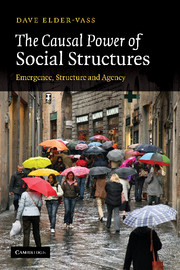7 - Organisations
Published online by Cambridge University Press: 06 December 2010
Summary
Contemporary social life is dominated by organisations – states, for example, businesses of all types and sizes, voluntary sector organisations, religious organisations, public enterprises, schools, universities, sports clubs and international organisations such as the United Nations and the World Bank. No serious attempt to explain events in the social world can ignore their influence. This chapter seeks to develop a new account of the structure of organisations that enables us to explain their causal capabilities.
Earlier organisation theorists took it for granted that organisations were social entities with causal influence: March and Simon, for example, had no hesitation in claiming that organisations ‘shape the goals and loyalties of their participants’ (March and Simon 1993 [1958]: 2). Yet such assumptions have come under fire, from two directions. Methodological individualists claim that the influence of all social entities can be reduced to the influence of the individuals who are their members and that social entities as such have no causal significance over and above that of their aggregated members (e.g. Watkins 1968). More recently, radical social constructionists have claimed that ‘organizations are discursive constructions and cultural forms that have no ontological status or epistemological significance beyond their textually created and mediated existence’ (as described by Reed 2005: 1622). As Westwood and Linstead put it, ‘The notion of structure is illusionary, representing only an ideological practice that pretends to stand in the place of the flux of shifting and seamless textual relationships’ (as cited in Reed 2005: 1622; Westwood and Linstead 2001: 4–5).
- Type
- Chapter
- Information
- The Causal Power of Social StructuresEmergence, Structure and Agency, pp. 144 - 168Publisher: Cambridge University PressPrint publication year: 2010

